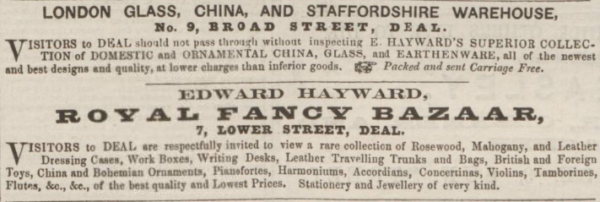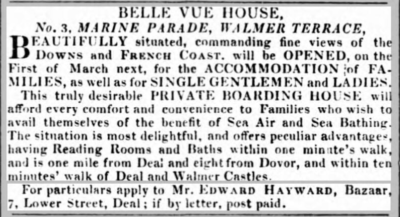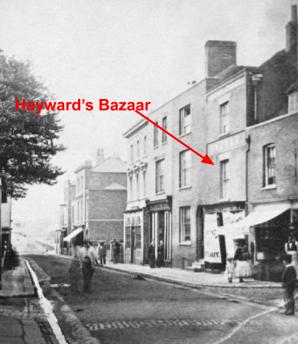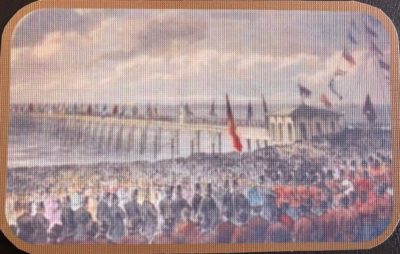Edward Hayward
7 Lower Street
9 Broad Street
53 Queens Street, Ramsgate
Hughenden House, Sondes Road
Occupation: Glass Dealer, Stationer, Printer, Fancy Bazaar Owner
Edward Hayward set up his Fancy Bazaar business at 7 Lower Street in the early 1830s selling a whole range of items made of china, glass and earthenware. According to a family source, found on Ancestry, he purchased 7 Lower Street in 1836, from plumber and glazier Mark Clayson who was listed as the occupier of the property on the 1821 census. The purchase price, we are told, was £650, £600 of which he borrowed, at 4%, from his neighbour, William Watt.
Before the internet or even the telephone, people with something to sell, or with property to rent, would often place a short advert in the newspaper and leave more detailed information with people such as Edward. Whether Edward charged for this service is not known but it makes good business sense for him to do this as his Bazaar got a free mention in the newspapers and interested parties would have visited his shop.
By 1863 Edward had opened another shop at 9 Broad Street selling domestic and ornamental glass and chinaware which sounds very much like he is appealing to the tourists and visitors to the town, especially as he also advertised that he mounted seashells and eventually he even hires out bicycles.
Deal Walmer & Sandwich Telegram
On 27 January 1858, from the Victoria Printing Office at 7 Lower Street, Edward printed the very first edition of the Deal, Walmer & Sandwich Telegram. This was then printed every Wednesday and sold for two pence. On the front page were local adverts and snippets of local news the other pages were made up of national and international news items.
Absconding Apprentice
As a Master Printer Edward took on apprentices who were then legally bound to him for a number of years. On 25 January 1860, he placed a notice in the Deal, Walmer & Sandwich Telegram saying that
“…Ambrose Alfred Leach my apprentice has unlawfully absented himself from my employ….. anyone found harbouring or employing Ambrose Alfred Leach after this notice will be prosecuted”
Why Ambrose absconded, or what happened after this advert was placed, we don’t know but in 1871 he is living in Coventry with his widowed mother and two sisters.
Fraud
In February 1855 a William Blenkarn asked Edward to cash a cheque for £30. As William was known to Edward, and as he had already cashed cheques for him before he thought nothing of doing so again. He didn’t have that amount of spare cash readily available so he signed the back of the cheque and sent it up the road to the National Provincial Bank. The cash came back in what Edward describes as country notes and as William Blenkarn didn’t want them Edward exchanged them for Bank of England notes and gold. Later that day the bank noticed that the date was wrong on the cheque and it was dishonoured by which time William Blenkarn had left Deal. In December a Metropolitan Detective visited Deal and took a statement Edward and others in the town. William Blenkarn, by this time was in custody and was eventually sentenced to twelve months imprisonment with six months hard labour.
Edward is perhaps most well known for his association with Deal Pier. A great gale in 1857 had brought down the first pier which had been constructed of wood and was never really completed. In his newspaper the Deal, Walmer & Sandwich Telegram he campaigned for a new Pier.
With grand ceremony, on Tuesday 8 November 1864, the new Pier was opened by Mrs Knatchbell-Hugessen. It must be safe to say, Edward, on that day must have been a very proud man.
Deal, Walmer and Sandwich Mercury
Edward launched a second newspaper the Deal, Walmer and Sandwich Mercury in 1865 this was later sold to Benjamin Eastes and Robert Newby and in 1880 it was acquired by Thomas Frederick Pain in whose family it remained until 1980.
Bankruptcy
Maybe business wasn’t good or Edward simply found it hard to manage in his later years, but in 1888 he was in court for bankruptcy. A report on the proceedings in the Canterbury Journal in March 1888 indicates that Edward had let things slip. When asked if he had signed receipts, totalling £200, he replied “…I signed so many things I don’t know but I expect I did”. He then admitted that he simply signed receipts brought to him by his solicitor. It appears that at around this time Egbert, his son a house proprietor, bought the printing business from his father which probably helped to clear some of Edwards debts.
Soon after this, he moved to live with his widowed daughter, Fanny, in Lewisham where he died in 1891.





